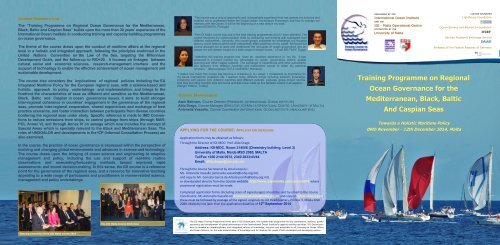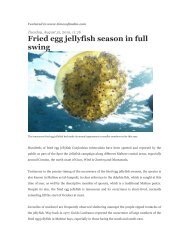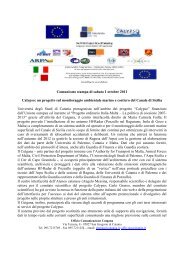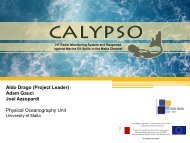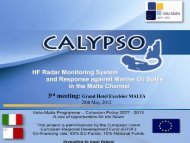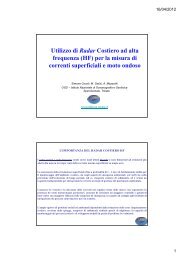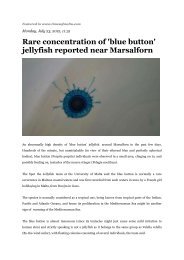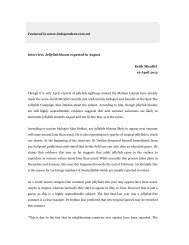Course Flyer - University of Malta
Course Flyer - University of Malta
Course Flyer - University of Malta
You also want an ePaper? Increase the reach of your titles
YUMPU automatically turns print PDFs into web optimized ePapers that Google loves.
COURSE PRESENTATION<br />
The “Training Programme on Regional Ocean Governance for the Mediterranean,<br />
Black, Baltic and Caspian Seas” builds upon the more than 30 years’ experience <strong>of</strong> the<br />
International Ocean Institute in conducting training and capacity building programmes<br />
on ocean governance.<br />
The theme <strong>of</strong> the course draws upon the conduct <strong>of</strong> maritime affairs at the regional<br />
level in a holistic and integrated approach, following the principles enshrined in the<br />
United Nations Convention on the Law <strong>of</strong> the Sea, targeting the Millennium<br />
Development Goals, and the follow-up to RIO+20. It focuses on linkages between<br />
natural, social and economic sciences, research-management interface and the<br />
support <strong>of</strong> technology to enable the effective achievement <strong>of</strong> ocean management and<br />
sustainable development.<br />
The course also considers the implications <strong>of</strong> regional policies including the EU<br />
Integrated Maritime Policy for the European regional seas, with a science-based and<br />
holistic approach to policy undertakings and implementation, and brings to the<br />
forefront the characteristics <strong>of</strong> seas as different and sensitive as the Mediterranean,<br />
Black, Baltic and Caspian in ocean governance issues. It aims to build stronger<br />
inter-regional coherence in countries’ engagement in the governance <strong>of</strong> the regional<br />
seas, promote inter-regional cooperation, shared experiences and exchange <strong>of</strong> best<br />
practice scenarios, and foster interaction between participants from diverse countries<br />
bordering the regional seas under study. Specific reference is made to IMO Conventions<br />
to reduce emissions from ships, to control garbage from ships (through MAR-<br />
POL Annex V), and through Annex IV on sewage which now includes the concept <strong>of</strong><br />
Special Areas which is specially relevant to the Black and Mediterranean Seas. The<br />
roles <strong>of</strong> UNDOALOS and developments in the ICP (Informal Consultation Process) are<br />
also examined.<br />
In the course, the practice <strong>of</strong> ocean governance is expressed within the perspective <strong>of</strong><br />
evolving and changing global environments and advances in science and technology.<br />
The course draws upon the bridging <strong>of</strong> ocean science and engineering to adaptive<br />
management and policy, including the use and support <strong>of</strong> real-time routine<br />
observations and nowcasting/forecasting methods toward improved rapid<br />
assessments, and sound decision-making. In this sense, the IOI course is a reference<br />
point for the governance <strong>of</strong> the regional seas, and a resource for innovative teaching<br />
appealing to a wide range <strong>of</strong> participants and practitioners in marine-related science,<br />
management and policy undertakings.<br />
“The course was a unique opportunity and unforgettable experience that has opened my horizons and<br />
enabled me to understand better the Global Ocean Governance Framework and how to manage our<br />
relations with the Ocean. It will be the beginning <strong>of</strong> a new area in my work.”<br />
(Joana DIONÍSIO, Portugal)<br />
“The IOI <strong>Malta</strong> course was one <strong>of</strong> the best training programmes which I have attended. The<br />
course improved my communication skills by interacting and working with colleagues from<br />
different nationalities. Secondly, this course greatly expanded my knowledge, my thoughts<br />
and my social network which shall undoubtedly affect positively on my career. Moreover this<br />
course assisted me to learn and understand the intricacies <strong>of</strong> ocean governance and endowed<br />
me with deeper insight on a wide range <strong>of</strong> related issues.” ( Ehab BELTAGY, Egypt)<br />
“Attending this training program has been an excellent experience in my life. It has<br />
enhanced in a holistic manner my knowledge on ocean governance, marine spatial<br />
planning and other related subjects. The exchange <strong>of</strong> experiences with other participants<br />
and lecturers from different countries and nationalities served to widen my personal<br />
horizons .” (Maria-Natasa TATUI-VAIDIANU, Romania)<br />
“I realise how much this course has become a milestone in my career. I understand its importance for<br />
my future international academic life. I learned many different things including scientific knowledge,<br />
socializing with people from different countries and different cultures. Lectures, group project studies,<br />
field trips and other touristic trips and social activities have made up five fantastic weeks in all aspects ”<br />
(Sezgin TUNCA, Turkey)<br />
COURSE MANAGEMENT<br />
Awni Behnam, <strong>Course</strong> Director (PRESIDENT, INTERNATIONAL OCEAN INSTITUTE)<br />
Aldo Drago, <strong>Course</strong> Manager (DIRECTOR, IOI-MALTA OPERATIONAL CENTRE, UNIVERSITY OF MALTA)<br />
Antonella Vassallo, <strong>Course</strong> Coordinator (INTERNATIONAL OCEAN INSTITUTE, HEADQUARTERS)<br />
APPLYING FOR THE COURSE: APPLICATION DEADLINE<br />
Application forms may be obtained as follows:<br />
Through the Director <strong>of</strong> IOI-MOC: Pr<strong>of</strong>. Aldo Drago<br />
Address: IOI-MOC, Room 314/5/6 (Chemistry building, Level 3)<br />
<strong>University</strong> <strong>of</strong> <strong>Malta</strong>, Msida MSD 2080, MALTA<br />
Tel/Fax +356 2144 0972, 2340 2833/43/44<br />
Email: aldo.drago@um.edu.mt<br />
Through the <strong>Course</strong> Secretariat by email enquiry:<br />
Ms. Antonella Vassallo (antonella.vassallo@ioihq.org.mt)<br />
and copy to Mr. Gonzalo Garcia de Arboleya (info@ioihq.org.mt)<br />
or downloaded directly from the course website http://www.capemalta.net/course2014 where<br />
provisional registration must be made.<br />
Completed application forms (including scans <strong>of</strong> signed pages) should be sent by email to the <strong>Course</strong><br />
Coordinator, Ms Antonella Vassallo on antonella.vassallo@ioihq.org.mt and copy to info@ioihq.org.mt;<br />
these must be followed by postage <strong>of</strong> the signed originals to: IOI Headquarters, PO.Box 3, Msida MSD<br />
2080, <strong>Malta</strong> by not later than the application deadline <strong>of</strong> 12 th September 2014<br />
ORGANISED BY THE<br />
International Ocean Institute<br />
AND THE<br />
IOI - <strong>Malta</strong> Operational Centre<br />
ACCREDITED BY THE<br />
<strong>University</strong> <strong>of</strong> <strong>Malta</strong><br />
COURSE SPONSORS<br />
Lighthouse Foundation<br />
Ocean Science and Research Foundation<br />
German Academic Exchange Service<br />
Embassy <strong>of</strong> the Federal Republic <strong>of</strong> Germany<br />
Training Programme on Regional<br />
Ocean Governance for the<br />
Mediterranean, Black, Baltic<br />
And Caspian Seas<br />
Towards a Holistic Maritime Policy<br />
09th November - 12th December 2014, <strong>Malta</strong><br />
Embassy<br />
<strong>of</strong> the Federal Republic <strong>of</strong> Germany<br />
Vall etta<br />
Opening Ceremony <strong>of</strong> the IOI <strong>Malta</strong> course 2013<br />
The IOI <strong>Malta</strong> <strong>Course</strong> 2013 class<br />
The IOI <strong>Malta</strong> Training Programme forms part <strong>of</strong> IOI-OceanLearn, the system-wide programme for the coordination, delivery, quality<br />
assurance and development <strong>of</strong> global partnerships <strong>of</strong> the International Ocean Institute’s capacity building activities. IOI-OceanLearn<br />
aims to develop an interdisciplinary and integrated culture <strong>of</strong> knowledge, inclusive and accessible to all, focusing on Ocean Affairs<br />
and Ocean Science, for the wide dissemination <strong>of</strong> knowledge and for meeting the needs <strong>of</strong> both developed and developing nations.
COURSE CONTENT<br />
The course curriculum is divided into four main modules giving altogether a<br />
broad approach to the theme <strong>of</strong> the course.<br />
MODULE 1 - Global Ocean Governance Framework: sets out the objectives <strong>of</strong><br />
ocean governance and the linkages to socio-economic issues, integrated and<br />
ecosystem ocean management, and resource exploitation. The focus is on the<br />
understanding <strong>of</strong> effective governance frameworks to put maritime policy into<br />
practice, including the mandate and efforts <strong>of</strong> the International Maritime Organisation,<br />
and on the MDGs with a regional perspective for the benefit <strong>of</strong> sustainable<br />
development, eradication <strong>of</strong> poverty, enhancement <strong>of</strong> partnerships and promotion <strong>of</strong><br />
the concept <strong>of</strong> the Common Heritage <strong>of</strong> Mankind.<br />
MODULE 2 - Managing our Relations with the Oceans: covers traditional policy,<br />
legal and institutional tools <strong>of</strong> the Blue Economy and Blue Growth, focusing on the<br />
science-management interface and bringing to light new perspectives, practices,<br />
methodologies and the use <strong>of</strong> technology for the effective and sound<br />
operationalisation <strong>of</strong> ocean governance. This module covers methods <strong>of</strong> national<br />
marine coastal zone policies development; the use <strong>of</strong> marine data for informed<br />
decisions, products and services; maritime spatial planning principles; integrated<br />
coastal zone management; the role <strong>of</strong> coastal communities; vulnerability assessment;<br />
environmental risk evaluation and mitigation <strong>of</strong> marine-related natural hazards; marine<br />
pollution and related efforts.<br />
MODULE 3 - Conflict Management, Consensus Building: addresses those<br />
conflicting interests that can be a barrier to effective ocean governance and<br />
management. This module covers the mechanisms available for conflict prevention,<br />
conflict management through peaceful resolution and consensus-building techniques.<br />
It introduces participants to foresight study methods and tools for future-oriented<br />
assessments and planning.<br />
MODULE 4 - Regional Ocean Governance Frameworks for the Mediterranean,<br />
Black, Baltic and Caspian Seas: targets the governance frameworks for these<br />
regional seas on the basis <strong>of</strong> current realities, future needs and an in-depth study <strong>of</strong><br />
their geophysical, socio-economic and political contexts. The module includes<br />
inter-comparisons between the regions, the reality <strong>of</strong> the European Union, its<br />
Integrated Maritime Policy and its Neighbourhood Policy, as well as existing binding<br />
protocols and conventions (including IMO-related conventions in the regional seas). It<br />
targets ideal governance frameworks through case studies and best-practice<br />
scenarios taken from regional experiences.<br />
ADMISSION REQUIREMENTS AND TARGETED PARTICIPANTS<br />
The training programme is specifically designed to benefit policy-makers, civil<br />
servants, mid-career pr<strong>of</strong>essionals, educators, researchers and civil society members<br />
having coastal/marine related responsibilities, functions or interests. The course is<br />
open to participants from countries bordering the regional seas. Preference will be<br />
given to candidates from developing countries <strong>of</strong> the regional seas. Applicants from<br />
developed countries or countries outside the region can be considered only if they<br />
have full funding or are registered at the <strong>University</strong> <strong>of</strong> <strong>Malta</strong> as graduate students.<br />
Participants from other developing countries outside the region may also be<br />
considered on a case by case basis.<br />
Participants should preferably be between 20 and 40 years <strong>of</strong> age, and possess at<br />
least a first degree in a field relevant to marine affairs and science. The course will<br />
require a full time commitment by participants on the basis <strong>of</strong> six hours <strong>of</strong> class work<br />
daily over a five-day week. The course programme involves lecturing and classroom<br />
sessions as well as hands-on sessions and extra-classroom activities during some<br />
evenings and weekends. Many <strong>of</strong> the exercises and presentations involve group work<br />
and each participant is expected to provide input to shared activities.<br />
The course will be conducted in English. Participants must be able to understand,<br />
write and speak English fluently.<br />
All applicants must seek funding for the training programme and as part <strong>of</strong> the<br />
application process candidates should submit pro<strong>of</strong> <strong>of</strong> their attempts to find at least<br />
partial support. A limited number <strong>of</strong> full or partial scholarships for the course are<br />
available covering airfare, board and lodging, field trip expenses, teaching materials,<br />
tuition for the course, and a small allowance to cover miscellaneous expenses. It does<br />
not include a salary and participants are expected to continue receiving a salary from<br />
their employer during the course.<br />
Successful applicants must be willing to complete some specified reading and<br />
preparatory work prior to the course.<br />
The relevant application form must be downloaded from the course website<br />
(http://www.capemalta.net/course2014) and completed in full, with the endorsement <strong>of</strong><br />
the appropriate Government ministry, agency or department, university or equivalent<br />
institution, by a national or regional organisation or by an IOI-Centre Director.<br />
Advance applications via email must be received by the deadline and be followed by<br />
mailed signed originals.<br />
REGIONAL SEAS CONCERNED<br />
The Mediterranean, Black, Baltic and Caspian Seas have differences but also<br />
important similarities. A major similarity is that they are geographically enclosed or<br />
semi-enclosed and potentially subject to national maritime zones in their entirety.<br />
These seas have fragile ecosystems and biodiversities that are put under individual<br />
and cumulative pressure. As a result the activities and maritime policies <strong>of</strong> one state<br />
are bound to affect the quality <strong>of</strong> the marine environment <strong>of</strong> and the use enjoyed by<br />
other regional states. In this relationship, the EU Integrated Maritime Policy and the<br />
need to achieve coherence <strong>of</strong> policies <strong>of</strong> neighbouring states are investigated in depth<br />
as basis for regional cooperation. These seas have different levels <strong>of</strong> experience in<br />
regional environmental cooperation and maritime use and the diversity and wealth <strong>of</strong><br />
experience provides an opportunity for comparative learning.<br />
COURSE DATE AND VENUE<br />
The course will be held in <strong>Malta</strong> and shall extend over a period <strong>of</strong> 5 weeks from<br />
the 09th November to 12th December 2014. Applicants are expected to take<br />
personal responsibility in acquiring entry and transit visas in connection with the<br />
training course; guidance will be provided by the course secretariat.<br />
Visa information and requirements for <strong>Malta</strong> can be obtained from<br />
(http://www.capemalta.net/course2014/visa); participants are responsible for<br />
making Visa Entry arrangements for <strong>Malta</strong> in good time.<br />
ACCREDITATION<br />
Completion <strong>of</strong> the full course and fulfilment <strong>of</strong> the course work to the required<br />
standards will lead to a Certificate in Ocean Governance accredited by the <strong>University</strong><br />
<strong>of</strong> <strong>Malta</strong>.<br />
Snapshot from a field trip during the 2012 course<br />
Expert from the EU Maritime Task Force lecturing during<br />
the dedicated seminar on the EU Maritime Policy<br />
IOI <strong>Malta</strong> <strong>Course</strong> 2007<br />
- participants socializing together<br />
IOI <strong>Malta</strong> <strong>Course</strong> 2012<br />
- students working together as a team


